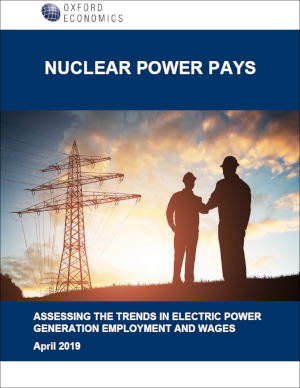Ungated Post | 01 Apr 2019
Nuclear Power Pays: Assessing the Trends in Electric Power Generation Employment and Wages

This report seeks to illustrate and articulate the US nuclear power industry as a driver of highly educated, high-skilled workers who earn premium wages.
The nuclear power sector provides 20 percent of the electricity needs in the US, and it supports tens of thousands of well-paying jobs throughout the country.
In 2017, the nuclear power generation industry employed nearly 48,400 workers in the US paying an average salary of $136,600. This exceeded average regional wages across the country and placed nuclear power as the highest paying industry in the electric power generation sector.
With such high wages, it’s not surprising that skilled occupations account for nearly 86 percent of total jobs in the industry.
Read more about the trends in the electric power generation employment and wages
Oxford Economics’ team is expert at applying advanced economic tools that provide valuable insights into today’s most pressing business, financial, and policy issues.
To find out more about our capabilities, contact:
EMEA
Sam Moore
+44 (0)207 803 1415
Email
Americas
Hamilton Galloway
+1 (646) 503 3068
Email
Asia
Christie Tang
+852 3974 8841
Email
Related Services

Post
The economic impact of abandoning the WTO
Oxford Economics have been commissioned by the International Chamber of Commerce (ICC) to provide an independent assessment of the economic impact of WTO dissolution. This report details our findings and the assumptions underpinning our analysis.
Find Out More
Post
The economic impact of the sports activities of public service media
This study shows how the sports activities of public service media supported €4.5 billion of GDP and 57,000 jobs across 31 European countries in 2022. The report also highlights wider economic benefits of public service media sports coverage, such as the way in which it leverages sponsorship income for sports bodies.
Find Out More
Post
Global Trade Education: The role of private philanthropy
Global trade can amplify economic development and poverty alleviation. Capable leaders are required to put in place enabling conditions for trade, but currently these skills are underprovided in developing countries. For philanthropists, investing in trade leadership talent through graduate-level scholarships is an opportunity to make meaningful contributions that can multiply and sustain global economic development.
Find Out More